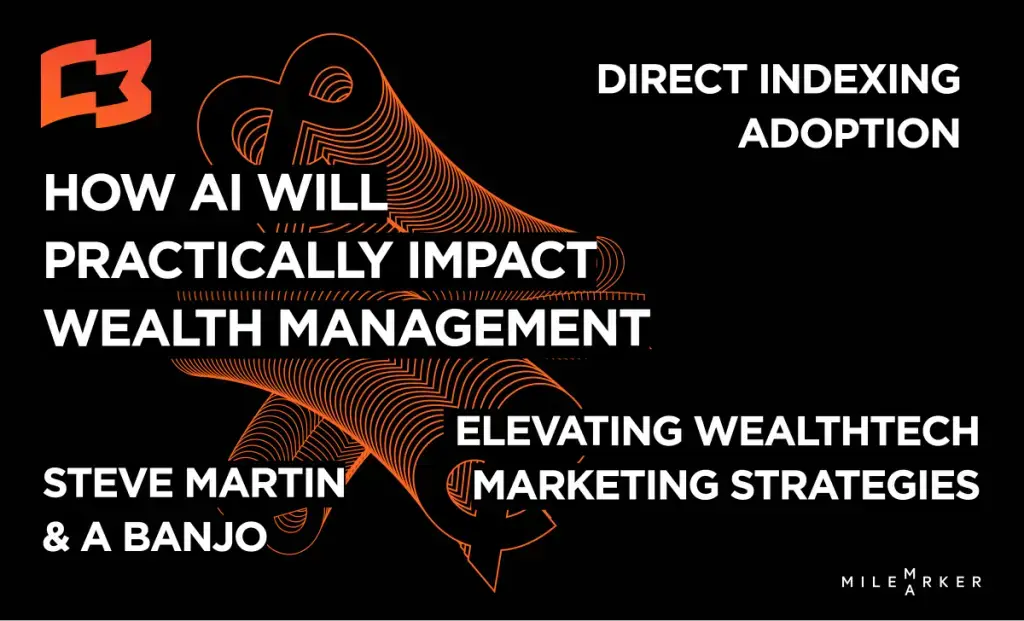AI’s Over/Under: How AI Will Practically Impact Wealth Management

Today, we can’t visit any news source without hearing about AI and its larger-than-life applications.
TV and movies have touched on AI and similar ideas forever. Heck, I’ve talked about it a lot in Connected, in the press and on a bunch of podcasts.
In fact, I kicked off my week with my friends Jack Sharry and Matt Nollman talking AI on the WealthTech on Deck podcast. Produced by the Turncast team, Jack’s show is arguably the best podcast out there on the reality that is wealth technology that is truly powering the future of wealth management.
On a topic that gets a lot of buzz, its often difficult to separate the signal from the noise.
Jack and I ran through a lot of ideas around AI and cut to the clear facts on where its overrated and where its truly practical.
To me, AI is becoming increasingly practical. We are seeing it analyze complex data and simplify lots of situations. We are seeing it transform functions that used to require teams of people and create instant scale inside of RIA’s and BDs.
Depending on who you are, what you have to deal with in terms of technology support, compliance overloads and general time, you have a varied experience on where AI has relevance for you now and tomorrow.
Let me break down a few things that Jack and I discussed as they are really relevant to the decision-makers who read Connected.
Why AI is Overhyped
Simply put, AI is overhyped.
Media outlets, shows and movies love to depict AI as a highly advanced and autonomous technology that can mimic human intelligence perfectly.
But this couldn’t be further from the truth. AI is effectively in its infancy, and the need for human intelligence, especially when it comes to financial advice, will not be going anywhere anytime soon.
Here are just a few of the most prominent limitations AI has when it comes to replacing financial advisors:
Lack of Contextual Understanding: Financial decisions are influenced by individual circumstances, family dynamics, and life goals. Humans can better understand a client’s situation’s broader context and nuances, leading to more tailored and relevant advice.
Complex Decision-Making: Financial advice often involves intricate decisions that require weighing various options, considering long-term implications, and understanding each client’s unique needs. Human advisors can engage in nuanced discussions to help clients make informed choices.
The Broader Scope: Financial decisions are often intertwined with non-financial goals such as philanthropy, legacy planning, and personal values. Human advisors can help clients align their financial decisions with these broader aspirations.
AI cannot yet replicate the unique qualities that human financial advisors bring to the table—such as empathy, emotional intelligence, personalization, and a holistic understanding. The personalization element of having a financial advisor is invaluable.
Notice I said, yet.
Why AI is Underhyped
While AI isn’t the end-all-be-all, it certainly has its place in all of our businesses.
It’s about knowing what AI to implement and where to implement it in your business to optimize processes and enhance decision-making.
Here are a couple of my favorite AI tools that I use every single day:
Loom AI is a video messaging tool that allows you to easily record yourself, your screen or both simultaneously to efficiently share ideas. Simply hit record and share the link to the video (which anyone can view without having to make a Loom account) with team members, business partners, clients or prospective clients.
Loom also automatically creates a written transcript of each video as well as creates a customized title.
Fathom is an AI virtual meeting assistant to record, transcribe, highlight, and summarize your virtual meetings via Zoom, Microsoft Teams, or Google Meet.
Fathom also integrates with your CRM (Salesforce, HubSpot, etc.) to sync your highlights & notes to any matching Contacts, Accounts, & Opportunities, as well as auto-generates call & action item summaries that can be dropped into Notion, Google Docs, Asana, Todoist and Gmail with a single click.
My favorite part about both of these tools: all you have to do is just hit record, and AI does the rest.
The New 80/20
I believe that with AI, there’s a new 80/20 emerging.
80% AI-driven analysis, 20% subjective assessment.
80% AI may seem like a lot, but hear me out.
As AI handles routine tasks, data analysis, and algorithmic trading – real life advisors can focus on high-value activities like personalized advisory, emotional support, ethical considerations, and complex decision-making.
The operational aspects of our businesses that AI has the potential to effectively and efficiently navigate often require the most attention throughout the day. AI enables you to automate the routine, time-consuming things in your business so you can spend your time on what matters most—spending time with your clients.
Taking a balanced perspective is usually the best way to go with most things in life, and AI/human intelligence is no different.
Future Uses of AI in Your Advisory Firm
You will see AI rework how simulations work.
For years the 1000-scenario Monte Carlo simulation was the standard. AI allows for the injection of even more considerations to redefine how precise our probabilities of success truly are. This will augment your work vs. replace it. You will now be able to talk about more advanced nuances that may play into the success of a plan.
AI will Streamline Your Asset Location.
Advisors know that they should be better organizing their household structures to better optimize for taxes across asset location. AI will automate this work in a matter of years.
AI will Redefine Client Experience.
As AI becomes more normal to your clients, it will lead them to expect more from you quickly. Rather than talking to you, they want to be able to prompt information from you. Your job will be finding how to do this within your current systems and client experience, compliantly and securely.
AI will Help You Focus on Your Highest and Best Use of Your Time.
The reality is that much of what we deal with most days is administrative. Wealth Management, when in its perfect state, is a creative work — although many things tend to take away that feeling of creativity. AI will help us automate insight gathering so that you can better manage the creative orchestra powering the guidance for your clients and the advisors you may also serve.
A growing number of organizations are already running hard at this.
Don’t believe me?
Check Morgan Stanley’s Job boards.
Where are you starting to see gains from AI in your own day-to-day?
When are you going to make an AI related hire or choose an AI related vendor?
Also, where are you seeing resistance to it?
